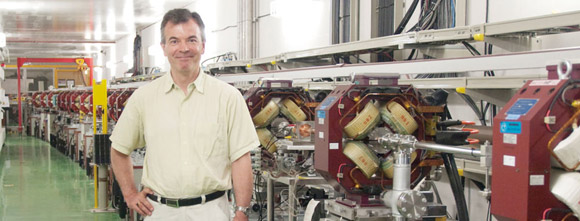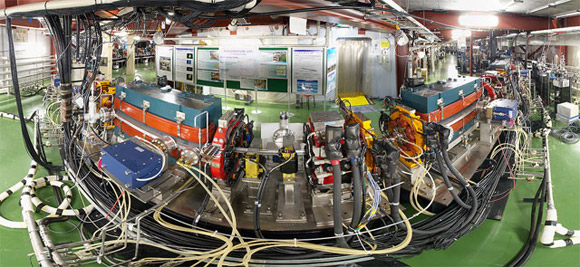Highlights
Never lost in translation - A French scientist working at the ATF
11 Aug 2010
Every day, KEK welcomes scientists and students from around the world. Some of them come here as collaborators who work on the international projects and programmes using cutting-edge facilities at KEK. Some visit as users who wish to use the beamlines at the Photon Factory to look into the smallest worlds. Many graduate students will write up their hard work here into their thesis. Many of them stay only days or weeks, but some of them stay longer to concentrate on the R&D for months or even years, like Dr. Philip Bambade from LAL in Orsay, France.
Bambade, a specialist on machine-detector interface, has travelled to Japan many times as a part of the international team working at the Accelerator Test Facility (ATF). The ATF is a test accelerator focused on generating the super-low-emittance beam, one of the essential techniques to realise the next electron-positron linear collider. The team has already achieved the smallest emittance in the vertical dimension. ATF is operating since 1997, and was upgraded with ATF2, a test facility for final focus system in 2009, with a 50-metre series of magnets. "The ATF and ATF2 together will help us better understand how to focus beams down to the tiny sizes required for next-generation accelerator, such as International Linear Collider or or the Compact Linear Collider," said Bambade. If more electrons and positrons are packed into a smaller space, they are more likely to collide with each other, and so more events will be observed. "It is so exciting to work with such a high-quality beam at ATF and ATF2," he said.

Fig 1
Dr. Philip Bambade form LAL at the ATF2 beamline.
He decided to live and work in Japan in spring 2008. "My wife agreed immediately. She understood the excitement of working at the ATF because she also has a physics background". Then, Bambade moved to Japan with his wife and two sons. He rented an apartment house in Tokyo, in the traditional Edo area near Asakusa, close to the French international school. He himself takes a 45-minutes train from the nearest station to KEK (which is not really 'near'), and took a local community bus to the bus stop 1 kilometre away form the lab, then, used a bike. "Well, it is not easy for me, but I want my sons to have an easier life in Japan and to experience Tokyo."
With their father's thoughtful attention, his sons got used to life in Japan easily, and they made friends right away. "Most of the students at the school are Japan-born French or those who have one Japanese parent, so their first language is Japanese. My sons took Japanese language classes at school and got introduced to the typical life style of Japanese teenagers." The younger son, Antoine, especially enjoys the life in Japan. "He once went on a ski trip with his friends. They took a late-night bus and stayed at a Minshuku, the Japanese style bed-and-breakfast. You would never think of sending only kids to a late-night bus trip in France. It would be too dangerous!" says Bambade. Antoine left Japan earlier than other family members since he was accepted into one of the most prestigious high-schools in France. Even though he was extremely happy to be accepted to the school, he misses his friends and life in Japan, and regrets a bit to have submitted the application.
While the Bambade boys were having good time, his wife Anna was spending some initial stressful days working out practical life in Japan. Many people who have lived in foreign countries might have had the same experience: to get frustrated because usual daily things such as grocery shopping, taking a subway, or talking with neighbors did not go smoothly. She also felt stress about the meticulous nature of Japanese life. Everybody makes a line to wait for the train at the stations; people are so orderly and careful about their personal appearance - at first, this perfectness made her feel uncomfortable, says Bambade. "She thought of it as a robot-like life." The Japanese way of communicating - less direct and not showing feelings, or using words as only part of the message - was also rather confusing for both of them at the beginning. "But I think those cultural difference are not a minus factor - they are in fact great learning opportunities and it probably took us a year to get used to them, to realise the many good sides of Japanese life and to understand Japanese people a bit better. Now, we can appreciate Japan's good culture such as honesty, reliance, and fair partnership, in both daily life and my job, said Bambade.

Fig 2
Wide-angle view of the South-West Arc section of ATF Damping Ring
His secondment contract will expire at the end of August. Any tips for Japan? "Well, I am pretty satisfied with our two years of life in Japan. If I would point out one thing, I would have liked to find a place to live more easily." Bambade family did not stay in the KEK dormitory, so they needed to find a landlord who accepts foreign tenants. Japanese landlords usually do not wish to have foreigner as their tenants because of communication issues. All contracts are written in Japanese, so they need to be translated. Also, you need your "in-kan", a special personal seal used in lieu of signatures in personal documents or official paperwork. "All of this was quite difficult for us to deal with, but fortunately we got lot's of help both in Tokyo and at KEK. It would have been impossible entirely on our own. I recommend them to anybody especially students to come stay in Japan, and work at ATF," said Bambade. "Three PhD students and two post-doctoral researchers whom I got involved with ATF at KEK easily found jobs after their work here. Three of them became fellows at CERN, one got a permanent job in France and another is getting one in China," Bambade said. ATF and ATF2 will continue to welcome scientists and students around the world.